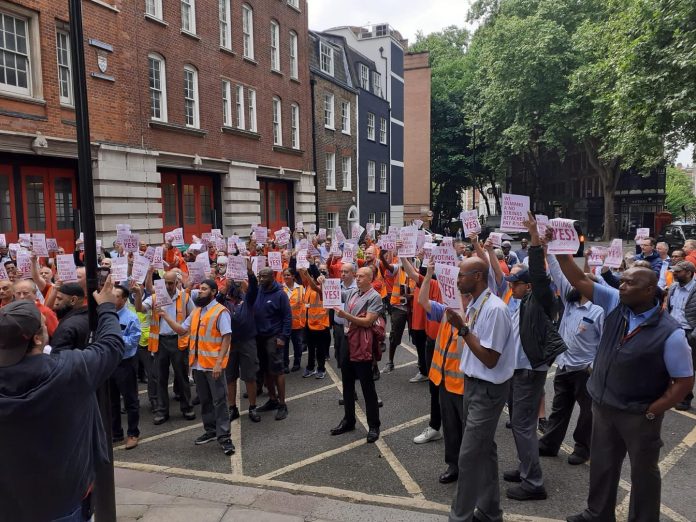Cost-of-living crisis or class war?
Mass gate meetings are taking place as postal workers in the Communication Workers’ Union (CWU) prepare for strike action on pay.
Tam Dewar, CWU Divisional Rep, Scotland, writes in a personal capacity
Postal workers, members of the CWU, are being balloted for strike action in support of an above-inflation pay rise.
The CWU believes that the workforce has earned the right to keep pay above inflation following their remarkable performance during the deadly Covid pandemic: keeping communities connected, sustaining e-commerce, and providing a life-saving service delivering and collecting test kits, often at personal risk. RPI inflation, at the time of writing is 11.1% and forecasted to rise further, heralding the biggest fall in living standards amongst workers since the 1980s.
Constant battle
Postal workers have been involved in a constant battle with successive Royal Mail boards since the formerly profitable postal service was privatised by the Tory-Lib Dem coalition. Flogged cheap to their spiv friends, the postal service has been held hostage by greedy investors and lamentably poor chief officers, committed to a vision of a low-wage, two-tier workforce, driving pay and conditions down to Amazon levels.
A groundbreaking deal, secured in 2021 by the CWU through collective action, protected terms and conditions and resisted the privatised market model of zero-hour contracts, no right to sick or annual leave pay, and no pension in retirement. Despite this, the employer continues to push a deterioration in terms to channel even more profits to shareholders and senior executives.
In response to a scheduled pay rise due in April this year, cack-handed managers have offered an insulting pay rise of 2% backdated to April – if the workforce accepts new terms for new staff. These would deprive them of existing benefits secured by previous generations of workers. Lower start pay rates for mainly part-time staff would effectively mean a two-tier workforce, where workers doing the same job would be paid differently.
Managers want a reduction in sick pay benefits and annualised hours. Sunday working would no longer be voluntary, and existing allowances for additional duties would be scrapped, forcing later start times and later deliveries for communities. If the workforce accepts these cuts in conditions, another 1.5% pay would be awarded on deployment.
Executive pay
This is as executive pay and pensions rocket, and as the company returns £400 million to already-rich shareholders – one shareholder’s return being £56 million alone. These profits were generated not by part-time cushioned board members, but by postal workers on the ground. Could there be any clearer example that this cost-of-living crisis is no less than a class war?
The CWU’s strength lies in its network of local workplace reps who are currently engaged in gate meetings and passing information to members to encourage participation in a ballot, if further negotiations fail to move the employer from its position.
The CWU has pioneered social media trade unionism and has delivered ‘yes’ votes above the obstructive anti-trade union legislation turnout requirements – often above 90% ‘yes’ votes. I have no doubt that postal workers will again respond to a request from our union for support.
In the wider context, the CWU has long campaigned for a new deal for workers. The union leadership strongly backed the former leadership of the Labour Party and secured commitments to policies that would improve workers’ rights. The relationship with the new Labour leader is more fractious.
The CWU has tried to coordinate action amongst sections of the TUC to lead a fightback against diminishing workers’ rights, with limited success. The draconian anti-trade union laws, designed to neuter the organised working class, limit the TUC to demonstrations and lobbying. When you consider the hours of broadcast media, glimpses of workers’ representatives from the trade union movement are as rare as hens’ teeth.
On the ground there is a different story emerging, of organised workers’ involvement in individual disputes across the sectors. University and college staff have fought a lengthy battle against pension cuts and deskilling. Rail workers have had a perpetual struggle in the privatised rail sector. Bus drivers have had some success in securing pay awards and truck drivers have seen pay increase substantially.
Anti-union laws
In contrast, the scandalous law-breaking of P&O demonstrates how employers can break the law with impunity, while trade unions which breach anti-union laws ultimately face the prospect of sequestration and, if found in contempt of court, possible jail time.
The political economic model of a regulated free-market economy based on competition is failing workers, and rewarding greed and avarice in the boardroom. Politicians have taken all the risks into the public sector and have privatised the wealth.
In line with low corporate and personal taxation, withdrawal of cradle-to-grave welfare, and the move from direct to indirect taxation, it now seems that the poor and those in work subsidise the already rich. Our history since 1979 has been of a mass transfer of power and wealth into the hands of the few. In the absence of elected representatives at all levels of government dedicated to the cause of labour it falls on workers organised into trade unions to defend existing terms and conditions and to protect what we have for the next generation of workers.







